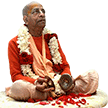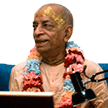Deity Worship - an essential subject: Difference between revisions
(Created page with "Category:Essential Subjects <!----------------------- edit below this line -----------------------> <!------------------------ begin introduction text --------------------...") |
(Vanibot #0041: Moves Choose Another box to the end) |
||
| Line 2: | Line 2: | ||
<!----------------------- edit below this line -----------------------> | <!----------------------- edit below this line -----------------------> | ||
<!------------------------ begin introduction text ------------------------> | <!------------------------ begin introduction text ------------------------> | ||
According to Vedic civilization, one should rise early in the morning, chant Hare Kṛṣṇa, perform maṅgala āratrika and worship the Deity. After reading from scriptures and taking breakfast everyone should go to their respective duties, Deity worship, sankirtana, cleaning. Throughout the day, this atmosphere of constant engagement, will produce the truly happy results of transcendental life. During Deity worship, high standards should always be kept, everything must be done very timely, and the temple must be immaculately cleansed daily. These things, cleanliness and promptness, are the most important points for Deity worship. Bhakti is a cleansing method, by engaging oneself in Deity worship, one also becomes cleansed. As one becomes enlightened or advanced in understanding, that he is eternal servant of Kṛṣṇa, he becomes purified. | |||
Srila Prabhupada's books, lectures, conversations and letters offer a comprehensive presentation of this essential subject as seen in the '''[[Vaniquotes:Category:Deity Worship| | Srila Prabhupada's books, lectures, conversations and letters offer a comprehensive presentation of this essential subject as seen in the Vaniquotes '''[[Vaniquotes:Category:Deity Worship|Deity Worship]]''' category. An introduction from his books is given below in the following 15 quotes. | ||
<!-------- end introduction text and don't touch next three lines ---------> | <!-------- end introduction text and don't touch next three lines ---------> | ||
---- | ---- | ||
== Quotes from Srila Prabhupada's books == | == Quotes from Srila Prabhupada's books == | ||
<!----------------- edit quote boxes below this line -----------------> | <!----------------- edit quote boxes below this line -----------------> | ||
{{VaniQuotebox| | {{VaniQuotebox|Especially for householder devotees who are opulent in material possessions, the path of Deity worship is strongly recommended|Especially for householder devotees who are opulent in material possessions, the path of Deity worship is strongly recommended. '''(Śrīmad-Bhāgavatam 7.5.23-24)'''}} | ||
{{VaniQuotebox| | {{VaniQuotebox|A householder should lead such a life that he gets full opportunity to hear and chant. He should worship the Deity at home, observe festivals, invite friends in and give them prasada. A householder should earn money for this purpose|A householder should lead such a life that he gets full opportunity to hear and chant. He should worship the Deity at home, observe festivals, invite friends in and give them prasāda. A householder should earn money for this purpose, not for sense gratification. '''(Śrīmad-Bhāgavatam 5.5.3)'''}} | ||
{{VaniQuotebox| | {{VaniQuotebox|Grhastha devotees, however, are generally engaged in material activities, and therefore if they do not take to Deity worship, their falling down is positively assured|The Deity worship in the temple should be performed especially by the householders. The brahmacārīs can go with the sannyāsīs to preach, and the vānaprasthas should prepare themselves for the next status of renounced life, sannyāsa. Gṛhastha devotees, however, are generally engaged in material activities, and therefore if they do not take to Deity worship, their falling down is positively assured. '''(Śrīmad-Bhāgavatam 7.5.23-24)'''}} | ||
{{VaniQuotebox| | {{VaniQuotebox|By His inconceivable potency the Lord can become the universal form, as explained in Bhagavad-gita, and at the same time He can remain within the box of His devotees as their worshipable Deity|By His inconceivable potency the Lord can become the universal form, as explained in Bhagavad-gītā, and at the same time He can remain within the box of His devotees as their worshipable Deity. The Supreme Lord, Keśava, or the Personality of Godhead, Kṛṣṇa, is not bound by any measurement of our calculation. He can remain with His devotee in any suitable form, yet He is unapproachable by any amount of demoniac activities. '''(Śrīmad-Bhāgavatam 3.19.24)'''}} | ||
{{VaniQuotebox| | {{VaniQuotebox|Because all these devotional activities are absolute, there is no fundamental difference between worshiping the Deity in the temple, seeing Him and chanting His glories|Because all these devotional activities are absolute, there is no fundamental difference between worshiping the Deity in the temple, seeing Him and chanting His glories. Indeed, all of these are ways of seeing Him, for everything done in devotional service is a means of direct contact with the Lord. '''(Śrīmad-Bhāgavatam 7.4.25-26)'''}} | ||
{{VaniQuotebox| | {{VaniQuotebox|Although Deity worship is not essential, the material conditioning of most candidates for devotional service requires that they engage in this activity|Although Deity worship is not essential, the material conditioning of most candidates for devotional service requires that they engage in this activity. When we consider their bodily and mental conditions, we find that the character of such candidates is impure and their minds are agitated. Therefore, to rectify this material conditioning the great sage Nārada and others have at different times recommended various kinds of regulations for Deity worship. '''(Caitanya-caritāmṛta, Madhya-līlā 15.108)'''}} | ||
{{VaniQuotebox| | {{VaniQuotebox|All devotees are in the disciplic succession stemming from Narada Muni because they worship the Deity according to Narada Muni's direction, namely the Narada Pancaratra, or the pancaratrika-vidhi|Jarā, the effect of old age, does not harass a devotee. This is because a devotee follows the instructions and the determination of Nārada Muni. All devotees are in the disciplic succession stemming from Nārada Muni because they worship the Deity according to Nārada Muni's direction, namely the Nārada Pañcarātra, or the pāñcarātrika-vidhi. '''(Śrīmad-Bhāgavatam 4.27.24)'''}} | ||
{{VaniQuotebox| | {{VaniQuotebox|A person who is engaged in the worship of the Deities can minimize his stock of sinful reactions coming from many, many previous births|A person who is engaged in the worship of the Deities can minimize his stock of sinful reactions coming from many, many previous births. This process of worshiping the Deity has already been described, and one should try to follow these rules and regulations seriously. '''(Nectar of Devotion, Chapter 9)'''}} | ||
{{VaniQuotebox| | {{VaniQuotebox|A neophyte is trained to perform activities in the mood of sacrifice, and he is encouraged to worship the Deities according to the scriptural injunctions|By nature children are restless and playful, so in the kindergarten they are given toys and games to interest them in learning. Similarly, a neophyte is trained to perform activities in the mood of sacrifice, and he is encouraged to worship the Deities according to the scriptural injunctions. The expert Vaiṣṇava preceptor then gradually draws him toward the platform of pure devotion by narrating the spiritually potent topics of Kṛṣṇa consciousness and giving him the remnants of food offered to the Supreme Lord. '''(Renunciation Through Wisdom, Chapter 2.3)'''}} | ||
{{VaniQuotebox| | {{VaniQuotebox|A neophyte devotee certainly engages in worshiping the Deity, but he cannot appreciate the activities of a pure devotee|A prākṛta devotee, or neophyte devotee, is still on the material platform. He certainly engages in worshiping the Deity, but he cannot appreciate the activities of a pure devotee. It has actually been seen that even an authorized devotee who is engaged in the service of the Lord by preaching the mission of Kṛṣṇa consciousness is sometimes criticized by neophyte devotees. '''(Śrīmad-Bhāgavatam 7.14.39)'''}} | ||
{{VaniQuotebox| | {{VaniQuotebox|One should not engage paid brahmanas to worship the Deity. If one does not personally worship the Deity but engages paid servants instead, he is considered lazy, and his worship of the Deity is called artificial|One should not engage paid brāhmaṇas to worship the Deity. If one does not personally worship the Deity but engages paid servants instead, he is considered lazy, and his worship of the Deity is called artificial. An opulent householder can collect luxurious paraphernalia for Deity worship, and consequently for householder devotees the worship of the Deity is compulsory. '''(Śrīmad-Bhāgavatam 7.5.23-24)'''}} | ||
{{VaniQuotebox| | {{VaniQuotebox|One should not remain a kanistha-adhikari, one who is situated on the lowest platform of devotional service and is interested only in worshiping the Deity in the temple|One should not remain a kaniṣṭha-adhikārī, one who is situated on the lowest platform of devotional service and is interested only in worshiping the Deity in the temple. '''(Nectar of Instruction, Text 5)'''}} | ||
{{VaniQuotebox| | {{VaniQuotebox|One should perform his daily spiritual duties and then, with great attention, offer worship to the Deity of the Supreme Personality of Godhead, and also to the altar, the sun, water, fire and the spiritual master|One should perform his daily spiritual duties and then, with great attention, offer worship to the Deity of the Supreme Personality of Godhead. '''(Śrīmad-Bhāgavatam 8.16.28)'''}} | ||
{{VaniQuotebox| | {{VaniQuotebox|One should strictly follow this sastric injunction and worship the Deity, the Supreme Personality of Godhead, without offenses. The spiritual master is the direct representative of the Lord, and no one should consider him an ordinary human being|One should strictly follow this śāstric injunction and worship the Deity, the Supreme Personality of Godhead, without offenses. The spiritual master is the direct representative of the Lord, and no one should consider him an ordinary human being. By avoiding offenses against the Deity and the spiritual master, one can advance in spiritual life, or Kṛṣṇa consciousness. '''(Śrīmad-Bhāgavatam 5.17.14)'''}} | ||
{{VaniQuotebox| | {{VaniQuotebox|Other offenses are to worship the Deity after seeing a dead body, to pass air before the Deity, to show anger before the Deity, and to worship the Deity just after returning from a crematorium|Other offenses are to worship the Deity after seeing a dead body, to pass air before the Deity, to show anger before the Deity, and to worship the Deity just after returning from a crematorium. After eating, one should not worship the Deity until one has digested his food, nor should one touch the Deity or engage in any Deity worship after eating safflower oil or hing. These are also offenses. '''(Śrīmad-Bhāgavatam 7.5.23-24)'''}} | ||
<!----------------- edit quote boxes above this line -----------------> | <!----------------- edit quote boxes above this line -----------------> | ||
| Line 47: | Line 45: | ||
'''Deity Worship - [[Vaniquotes:Category:Deity Worship|explore more within this category]]'''. | '''Deity Worship - [[Vaniquotes:Category:Deity Worship|explore more within this category]]'''. | ||
{{EsentialSubjectTotal}} | |||
<div style="float:left;"> | |||
{{EssentialSubjectnav}} | |||
</div> | |||
__NOTOC__ | __NOTOC__ | ||
__NOEDITSECTION__ | __NOEDITSECTION__ | ||
Latest revision as of 16:05, 22 November 2020
According to Vedic civilization, one should rise early in the morning, chant Hare Kṛṣṇa, perform maṅgala āratrika and worship the Deity. After reading from scriptures and taking breakfast everyone should go to their respective duties, Deity worship, sankirtana, cleaning. Throughout the day, this atmosphere of constant engagement, will produce the truly happy results of transcendental life. During Deity worship, high standards should always be kept, everything must be done very timely, and the temple must be immaculately cleansed daily. These things, cleanliness and promptness, are the most important points for Deity worship. Bhakti is a cleansing method, by engaging oneself in Deity worship, one also becomes cleansed. As one becomes enlightened or advanced in understanding, that he is eternal servant of Kṛṣṇa, he becomes purified.
Srila Prabhupada's books, lectures, conversations and letters offer a comprehensive presentation of this essential subject as seen in the Vaniquotes Deity Worship category. An introduction from his books is given below in the following 15 quotes.
Quotes from Srila Prabhupada's books
Deity Worship - explore more within this category.
Vanipedia has now over 903 introductory articles compiled from Srila Prabhupada's books under the series titled Essential Subjects. All these articles can be seen in the Table of Content on the right side of this article and also here in this Umbrella Category. Browse through them to relish the breadth and depth of Srila Prabhupada's teachings - There is a subject for everyone.












